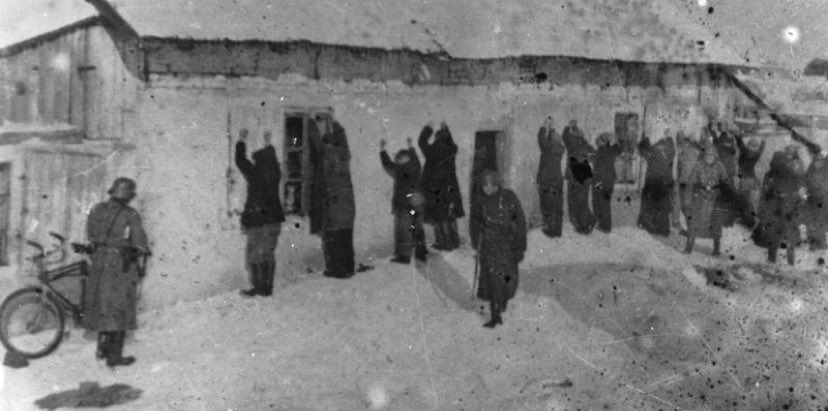In the early months of the war, one of the German massacres was during the occupation at Wawer, a summer resort near Warsaw.
Poles killed two German soldiers in a restaurant.
Within a few hours, German soldiers arrived and in reprisal and shot every tenth inhabitant of Wawer and of the adjoining thermal station of Amin.
Thirty-four of the victims were under 18 years of age. The owner of the restaurant was hanged
and buried. And then the Germans exhumed the body and hanged it again.
The gruesome episode in Wawer was consistent with the wishes of Hans Frank, administrator of the General Govern-ment, who declared, "My relationship with the Poles is like the relationship between ant and plant louse.... I would not even hesitate to take the most draconic action."
The Germans routinely killed 100 Poles for the death of one German, but there were instances where 200-400 Poles lost their lives in reprisal for the death of a German.
In Lublin, the Germans wiped out the entire village of Jozefow, men, women, and children-for the death of a German family.
Germans killed children not only in reprisal for actions but also in response to children making “anti-German statements” or displaying what the Germans called a "hostile mentality”.
W pierwszych miesiącach wojny jedna z niemieckich masakr miała miejsce podczas okupacji w Wawrze, letnisku pod Warszawą.
Polacy zabili w restauracji dwóch żołnierzy niemieckich.
W ciągu kilku godzin przybyli żołnierze niemieccy iw odwecie rozstrzelali co dziesiątego mieszkańca Wawra i przylegającej do niego ciepłowni Amin.
Trzydzieści cztery ofiary miały mniej niż 18 lat. Właściciel restauracji został powieszony
i pochowany. A potem Niemcy ekshumowali zwłoki i powiesili je ponownie.
Makabryczny epizod w Wawrze był zgodny z życzeniem Hansa Franka, administratora Generalnego Gubernatorstwa, który oświadczył: „Moje stosunki z Polakami są jak stosunki między mrówką a weszami roślinnymi… Nie wahałbym się nawet podjąć najbardziej drakońskie działanie”.
Niemcy rutynowo zabijali 100 Polaków za śmierć jednego Niemca, ale zdarzały się przypadki, że w odwecie za śmierć Niemca życie straciło 200-400 Polaków.
W Lublinie Niemcy wymordowali całą wieś Józefów, mężczyzn, kobiety i dzieci – za śmierć niemieckiej rodziny.
Niemcy zabijali dzieci nie tylko w odwecie za czyny, ale także w odpowiedzi na wygłaszanie przez dzieci „antyniemieckich wypowiedzi” lub przejawianie tego, co Niemcy nazywali „wrogą mentalnością”.






Brak komentarzy:
Prześlij komentarz